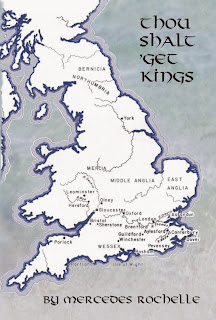Saturday, December 25, 2010
Thou Shalt ‘Get Kings by Mercedes Rochelle
In Thou Shalt ‘Get Kings, author Mercedes Rochelle examines the legendary origins of the Stuart Kings of Scotland and England, with her protagonist Walter. From the pages of William Shakespeare’s play, Macbeth, a father and son, Banquo and Fleance are late to King Macbeth’s banquet. On their journey, Banquo meets a treacherous end but Fleance escapes into Wales with the help of a boyhood friend. He settles into the court of the Welsh King Gruffydd ap Llywelyn at Rhuddlan. An illicit relationship with Gruffydd’s daughter Nesta results in the birth of their only child, Walter.
Despite the circumstances of his birth, Walter has an impressive heritage on his mother’s side, with the Welsh King as his grandfather and Aelfgar, the Earl of East Anglia as his great-grandfather. Still, Gruffydd shuns him and the boy grows into a warlike young man who struggles to control difficult emotions. When anger gets the better of him and culminates in murder, Walter flees to England, looking for Malcolm, rightful heir to the Scottish throne. He finds the man but also has a chance encounter with an enigmatic Harold Godwinson, destined to be the last Anglo-Saxon King. Walter’s journeys take him north to Scotland before a quick return to Wales. He also visits northern France, for life-changing encounters in Brittany and Normandy that will bring him back full circle to the past, and lead him to his destiny.
Readers who are familiar with Welsh history should keep in mind that the premise of Thou Shalt ‘Get Kings is primarily based on Stuart legend, interwoven with factual events of the time. What began as the story of Walter’s origins quickly becomes a view of the medieval world from varying historical perspectives, including the kings Gruffydd ap Llywelyn and Malcolm III of Scotland. The story takes the reader on a journey through a tumultuous period with varying stakeholders. Walter’s heritage and random circumstances grants him cachet for a personal interaction with several of these individuals. The author’s use of the omniscient POV allows a glimpse into the potential motivations of each character.
Labels:
11th Century,
England,
France
Subscribe to:
Post Comments (Atom)

No comments:
Post a Comment